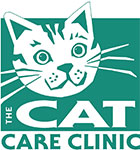Hill’s Pet Nutrition has just come out with a diet designed as a sole treatment for hyperthyroidism in cats. “Prescription Diet y/d” is a new alternative for controlling overactive thyroid disease in cats. The diet became available in early October.
Hyperthyroid cats typically have a benign growth on one or both lobes of their thyroid gland, and the result is over production of thyroid hormone in their bodies. Thyroid hormone has many different functions in the body but the main purpose is to regulate metabolism. Thyroid hormone affects every part of the body to some degree, but its major effects are on the heart, skin, and gastrointestinal tract.
Common clinical signs associated with hyperthyroidism are weight loss, increased appetite, increased thirst, increased urination, increased heart rate and possibly an irregular heartbeat, and often restlessness or hyperactivity. These signs can be seen with other diseases in senior cats, but your veterinarian can make a diagnosis of hyperthyroidism with a blood test that is part of a routine senior screen.
Uncontrolled thyroid disease will lead to many problems. Aside from poor general condition and a slow wasting process, a hyperthyroid cat can develop serious heart disease.
The treatment options for hyperthyroid cats have been drug therapy, surgery, or radioisotope treatment, but now we have the addition of dietary management.
Methimazole is the drug used to treat hyperthyroid cats. The veterinary approved product, Felimazole, has been on the market for several years and is very effective. Most cats require a tablet twice daily to control their disease. For those cats that will not tolerate tablets, methimazole can be reformulated by compounding pharmacies to a transdermal gel that can be applied to the ears. The absorption of the gel is not as consistent a treatment as the oral pill, but will be effective if administered properly.
Surgical removal of the thyroid gland has fallen out of favor as a treatment for hyperthyroidism due to the risk of also removing the parathyroid glands during the procedure. Also, there is more risk of causing too low a thyroid level in cats post operatively if no thyroid tissue remains.
Radioactive iodine treatment has been the gold standard of treatment and still remains so. The benefits of this treatment are it is a one-time treatment where the overactive thyroid tissue is selectively destroyed rather than the entire gland being removed, there is no risk of anesthesia, and the parathyroid glands are untouched.
Dietary control of hyperthyroidism is our new option. In order for this mode of treatment to be effective, the feline patient must eat Prescription Diet y/d exclusively. This means no treats, table food, or sneaking into other pet’s bowls. Prescription Diet y/d comes in both canned and dry forms. It works by limiting the amount of iodine in the diet. Iodine is needed by the thyroid gland to produce hormone, so production is restricted when there is very little iodine available, and the gland is unable to be overactive.
Prescription Diet y/d is an option for cats that are currently on oral medication or newly diagnosed cases. Owners of hyperthyroid cats need to discuss all of the available options with their veterinarian to decide which will work best in their individual situation. The diet may not be an appropriate option in a multiple cat household unless all resident cats eat the diet. It is not a good option for cats that go outdoors and eat other creatures or may snack at a neighbor’s home. Although the palatability of the diet is considered to be very good, some cats may not like it. It is recommended to gradually transition cats to the diet over a couple week period of time for the best likelihood of success.
Follow up thyroid level testing is recommended after cats have been eating y/d exclusively for three weeks. If the diet is not lowering the thyroid to acceptable levels, the other treatment options are still available.
If you have a senior cat that is losing weight, have him checked for hyperthyroidism and other common diseases. Hyperthyroid cats have an excellent prognosis for control of their disease and now have a new treatment option.
Written by Dr. Wexler-Mitchell of The Cat Care Clinic in Orange, CA
Copyright © 2012 The Cat Care Clinic
